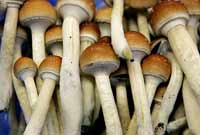Magic mushrooms can change your life for good, study says
Dede Osborn, a business consultant, took a psychedelic drug within the scope of a research project that she conducted at a laboratory of John Hopkins University. The woman said that the drug gave her the feeling of euphoria and joy. She said that she felt like she was flying. The experiment happened in 2002.

Nowadays, at age 66, Dede Osborn says that she still feels more centered in who she is and what she is doing. "I don't seem to have those self-doubts like I used to have. I feel much more grounded (and feel that) we are all connected,” she said.
The psychedelic drug was offered to 14 volunteers, who were surveyed 14 months after the experiments. Most of them said that they were still feeling and behaving better than they used to because of the drug. Some of them said that it was the most spiritually significant experiment which they have ever had.
The drug, known as psilocybin, can be found in so-called “magic mushrooms.” The use of the drug is illegal. However, it has been used on religious ceremonies for hundreds of years.
The study involved 36 men and women during an eight-hour lab visit. It's one of the few such studies of a hallucinogen in the past 40 years, since research was largely shut down after widespread recreational abuse of such drugs in the 1960s.
The project made headlines in 2006 when researchers published their report on how the volunteers felt just two months after taking the drug. The new study followed them up a year after that.
Experts emphasize that people should not try psilocybin on their own because it could be harmful. Even in the controlled setting of the laboratory, nearly a third of participants felt significant fear under the effects of the drug. Without proper supervision, someone could be harmed, researchers said.
Osborn, in a telephone interview, recalled a powerful feeling of being out of control during her lab experience. "It was ... like taking off, I'm being lifted up," she said. Then came "brilliant colors and beautiful patterns, just stunningly gorgeous, more intense than normal reality."
And then, the sensation that her heart was tearing open.
"It would come in waves," she recalled. "I found myself doing Lamaze-type breathing as the pain came on."
Yet "it was a joyful, ecstatic thing at the same time, like the joy of being alive," she said. She compared it to birthing pains. "There was this sense of relief and joy and ecstasy when my heart was opened."
With further research, psilocybin (pronounced SILL-oh-SY-bin) may prove useful in helping to treat alcoholism and drug dependence, and in aiding seriously ill patients as they deal with psychological distress, said study lead author Roland Griffiths of Johns Hopkins.
Griffiths also said that despite the spiritual characteristics reported for the drug experiences, the study says nothing about whether God exists.
"Is this God in a pill? Absolutely not," he said.
The experiment was funded in part by the National Institute on Drug Abuse. The results were published online Tuesday by the Journal of Psychopharmacology.
Fourteen months after taking the drug, 64 percent of the volunteers said they still felt at least a moderate increase in well-being or life satisfaction, in terms of things like feeling more creative, self-confident, flexible and optimistic. And 61 percent reported at least a moderate behavior change in what they considered positive ways.
Psilocybin mushrooms (also called psilocybian mushrooms) are fungi that contain the psychedelic substances psilocybin and psilocin, and occasionally other psychoactive tryptamines. There are multiple colloquial terms for psilocybin mushrooms, the most common being shrooms.
Psilocybin mushrooms are non-toxic and non-addictive although they do create short term increases in tolerance of users. Oral ingestion can produce nausea, dizziness, and sometimes vomiting. The greatest danger from recreational use is a "bad trip" which can cause severe emotional and psychological distress. Also, extremely poisonous wild picked mushrooms can be easily mistaken for psilocybin mushrooms. Mushrooms should be identified by a professional mycologist if ingestion is deemed appropriate. When psilocybin is ingested, it is broken down to produce psilocin, which is responsible for the hallucinogenic effects.
As with many psychoactive substances, the effects of psychedelic mushrooms are subjective and unpredictable. A common misconception, even seen in the professional environment, is that the effects experienced from psilocybin are due to a poisonous nature of the compound, yet the National Institute for Occupational Safety and Health, a branch of the Center for Disease Control, rated psilocybin less toxic than aspirin. The intoxicating effects of psilocybin-containing mushrooms typically last anywhere from 3 to 7 hours depending on dosage, preparation method and personal metabolism.
The experience is typically inwardly oriented, with strong visual and auditory components. Visions and revelations may be experienced, and the effect can range from exhilarating to distressing. There can be also a total absence of effects, even with large doses. This depends on the species (and to a much lesser degree the strain) of mushroom, substrate they grew from, the quality of the yield and conditions of growth.
Feelings of bliss, relaxation, wonder, anxiety, sadness, curiousness or fear have all been reported. Some users may experience intense episodes of hilarity, such as laughing for the duration of the psychedelic experience. Emotions can be experienced with increased sensitivity.
Higher doses carry the increased possibility of a surreal event known as ego death, whereby the user loses the sense of boundaries between their self and the environment, creating a sort of perceived universal unity. Users may experience intense feelings of connectivity with a higher power. Contradictory emotions, such as euphoria and despair, can be experienced simultaneously.
As with other psychedelics such as LSD, the experience, or "trip," is strongly dependent upon set and setting. A negative environment could likely induce a bad trip, whereas a comfortable and familiar environment would allow for a pleasant experience, although neither side of this binary is without exception.
Subscribe to Pravda.Ru Telegram channel, Facebook, RSS!





